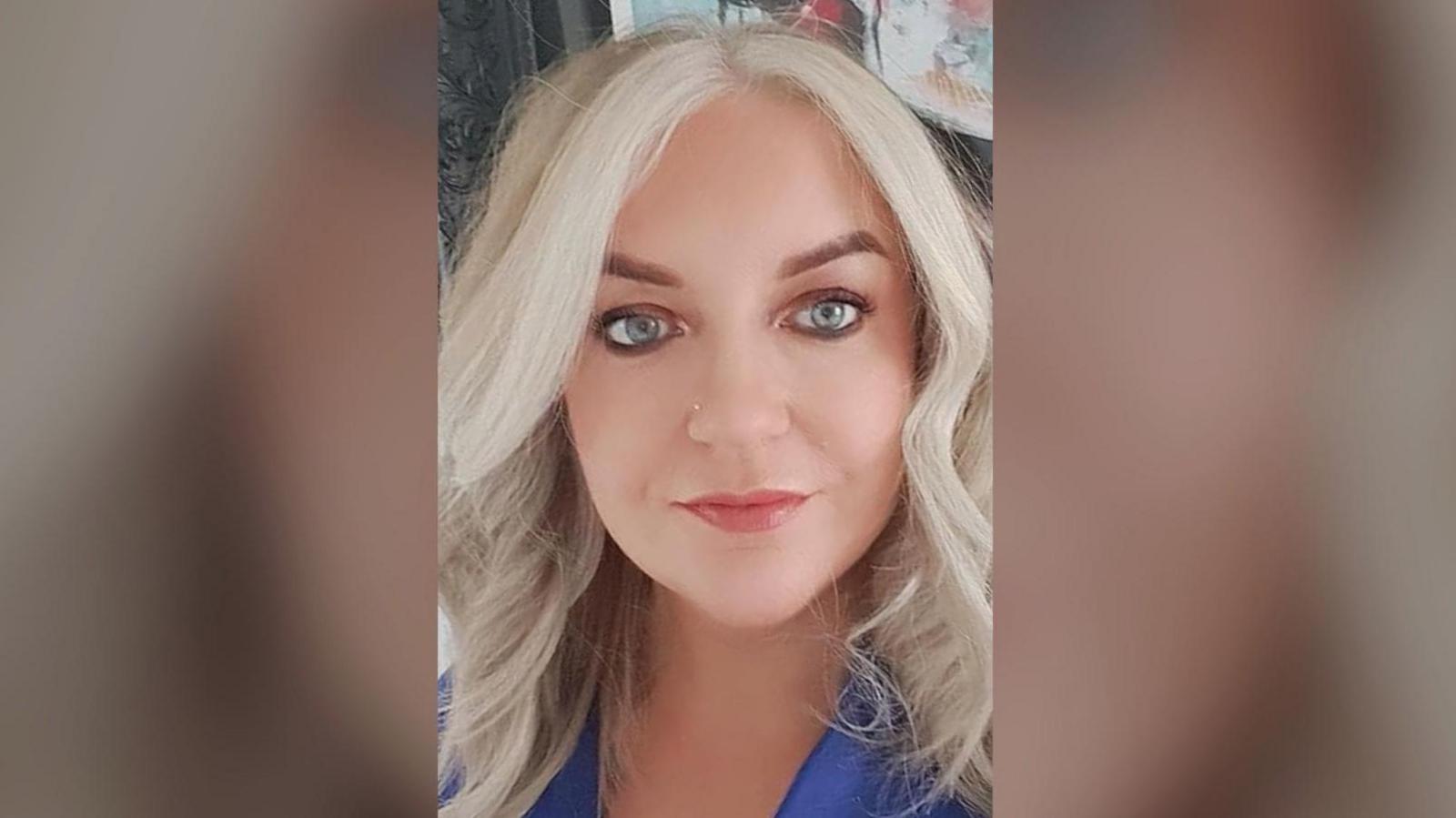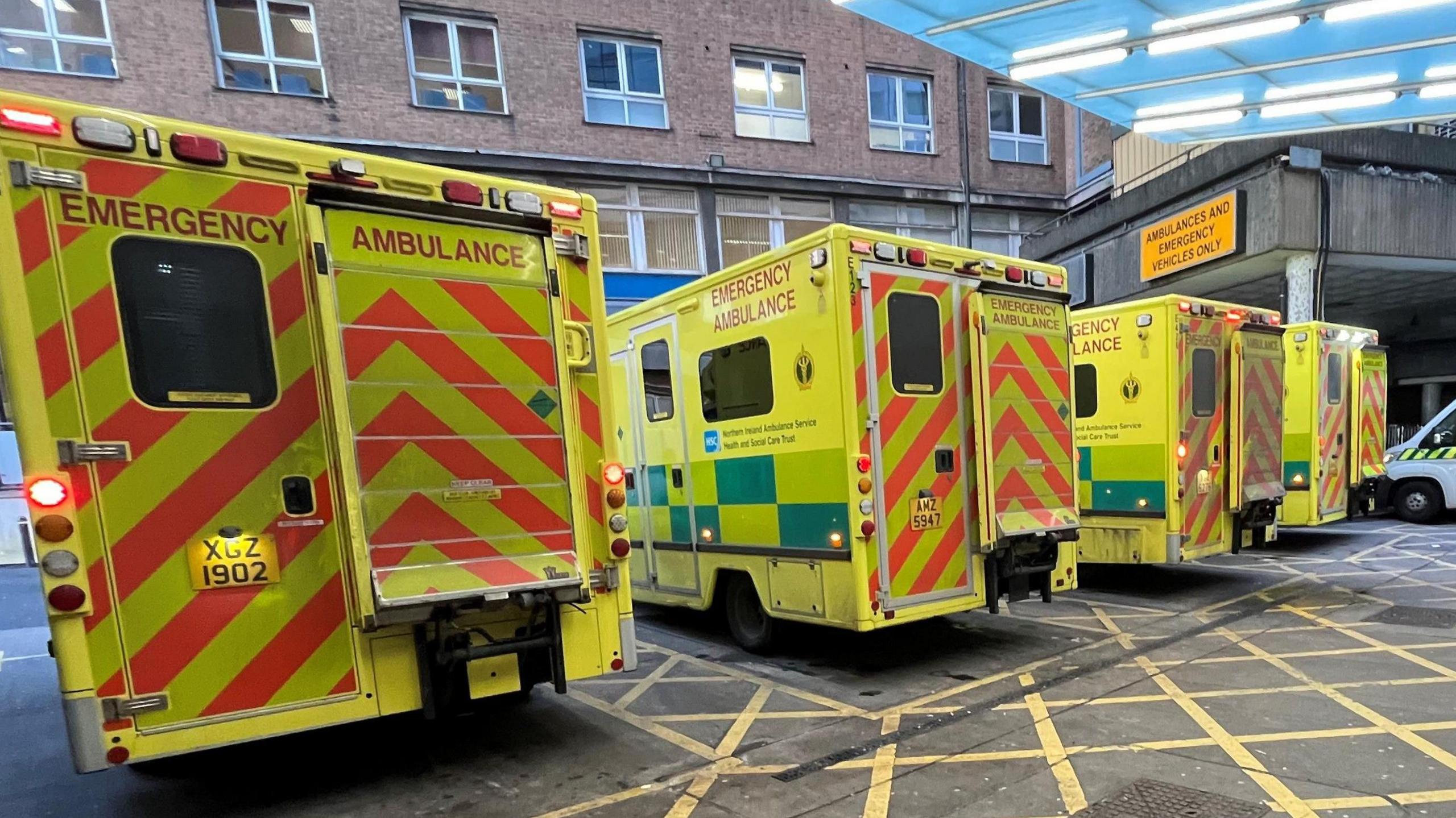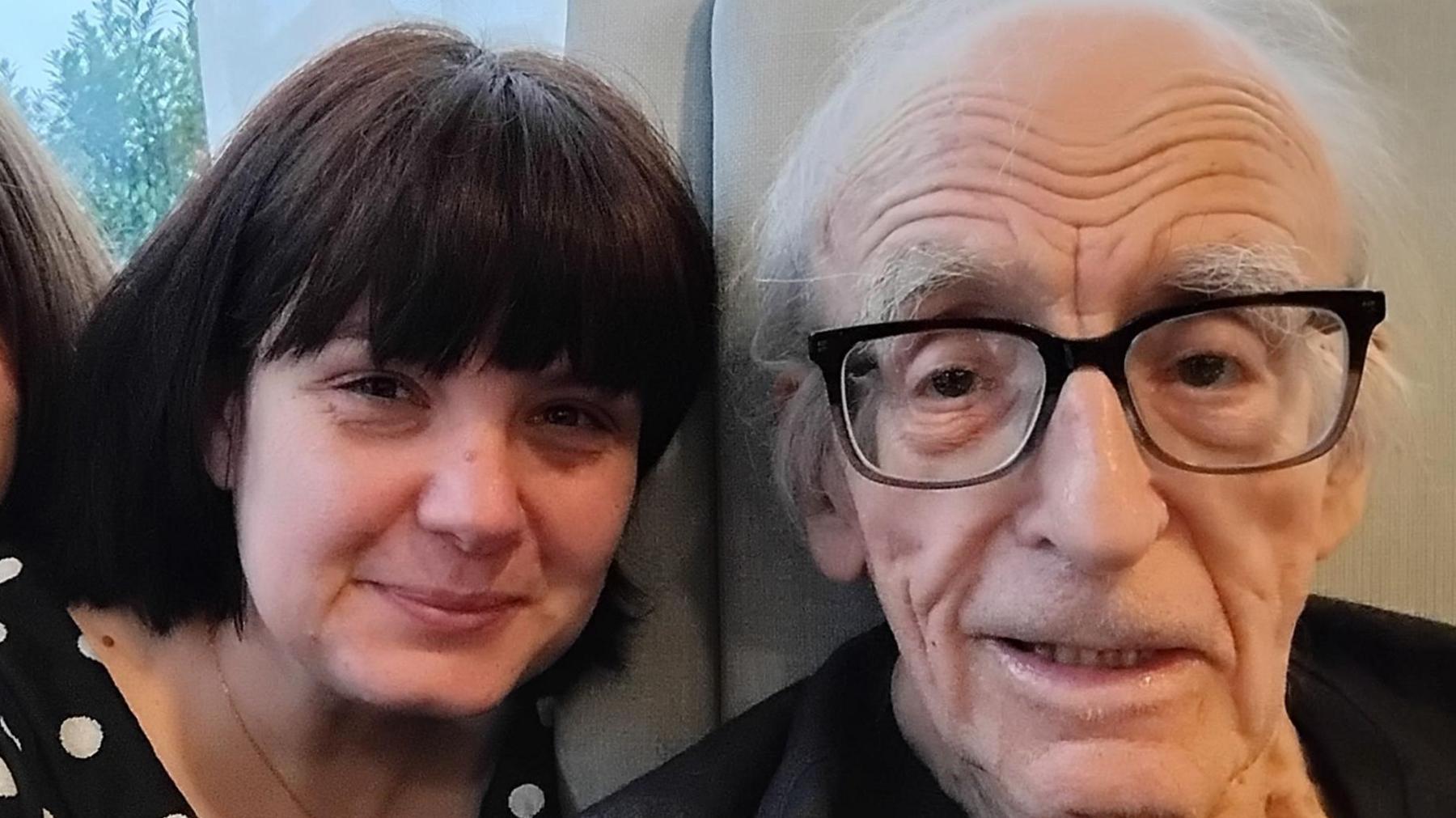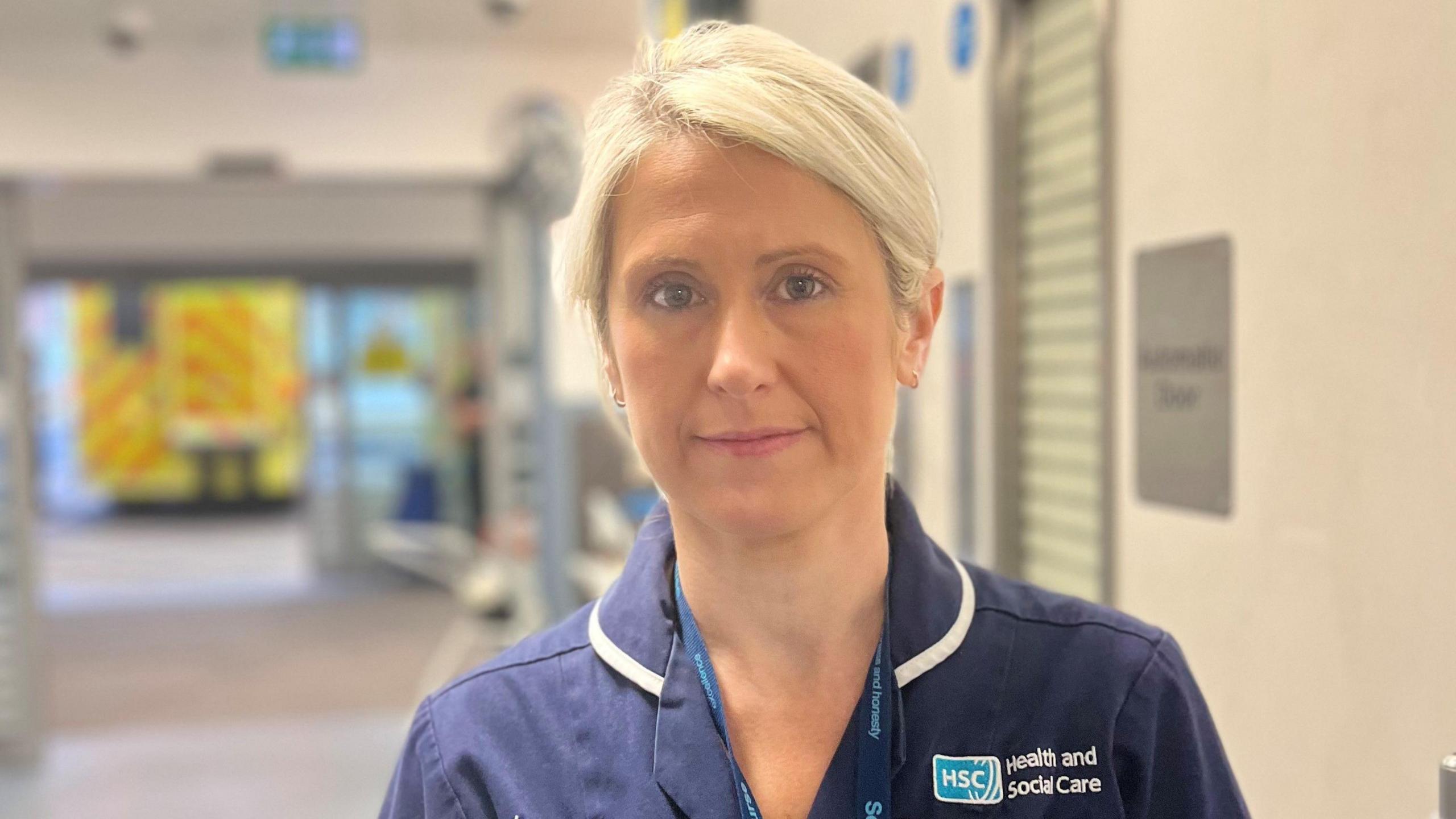Woman cut out of car spent seven hours in ambulance

Mary Donaghy was treated in an ambulance after a head-on crash in Belfast on Monday
- Published
The sister of a woman who spent more than seven hours in an ambulance outside Belfast's Royal Victoria Hospital's (RVH) emergency department has said she was left freezing and in terrible pain.
Mary Donaghy was involved in a head-on collision after her car hit black ice on the Hannahstown Road, Belfast on Monday morning.
It comes after hundreds of people waited for more than 12 hours at hospital emergency departments across Northern Ireland this weekend.
At an emergency meeting on Tuesday, Northern Ireland's health minister said "pressures are both serious and nationwide" and that patients often have to surrender "their dignity and their privacy".
Mike Nesbitt announced that flu vaccines, currently available for free to those aged 65 and over, would be extended to the 50-64 age group.
The announcement came after the minister revealed that there have been three point six times more patients hospitalised with flu this winter than last.
Nesbitt also said he intends to spend about £50m so that all social care workers can receive a "real living wage".
"That will help stabilise the system. Hopefully it will also attract new people to work in it," he added.
He also said that staff are suffering "moral injury" as "they did not sign up to deliver a service in this way".
'It's just not good enough'
Mary was cut from her car after the collision and was brought to the RVH, where she spent most of the day being cared for in the back of the ambulance.
Sharon said that Mary had no feeling in her legs, was in pain and freezing as paramedics used blankets and a vehicle heater to keep her warm.
"It's just not good enough, she's been given morphine for the pain, but she needs to be admitted, this is all so frustrating," she told BBC News NI while her sister waited in the ambulance.
Mary was moved to the emergency department trauma area later on Monday night, and has since received a CT and MRI scan.

Mary's sister Sharon (right) says current pressures are not good enough for patients
Sharon said the family had nothing but praise for the medical teams who were working in a "broken system," but was shocked to see where her sister was being treated.
"It is hard watching it and seeing her in so much pain. She just wants to feel ok and go home but at this stage she can't feel her legs," she added.
"It's not the staff's fault, it is the government's fault and people must be held to account.
"It's not good enough for Mary or for anyone right now."
Mary's partner Martin had spent most of the day in the ambulance and said it was "unbelievable" that someone who had been cut out of a car was being treated in an ambulance for so long.
'Challenging time'
Speaking at the emergency meeting on Tuesday, Tracey McCaig from the Department of Health said that the peak of the flu season had coincided with the Christmas period to create an influx of patients across Northern Ireland.
"When those two things collide, that's really challenging for us," she told the committee.
"From a resilience perspective and a capacity perspective we would have never had the available space and human resources to be able to manage that effectively," she added.
Dr Joanne McClean, Director of Public Health Agency, said that a "combination of flu on top of what is already a pressured system" had "resulted in particular difficulties."
"We do think we have reached the peak numbers and they're on the way down," Dr McClean added.

Hospitals across Northern Ireland, like the Royal Victoria Hospital, have been under pressure
A Belfast Health Trust spokesperson said this is not how the trust wants to treat emergency patients.
"Unfortunately the pressures on the system mean that people are having to wait longer that we would like," they added.

Claire Smales with her father Robert, they had to wait 23 hours for an ambulance
Claire Smales' father Robert is 88 years old and has dementia. After falling on New Year's Eve, he had to wait 40 hours before he was finally admitted to hospital.
Ms Smales has been speaking to BBC News NI.
She said they had to wait 23 hours for the ambulance to take her father. She said they then had to wait nine hours outside Ulster Hospital ED in the ambulance, followed by another eight hours inside the ED before he was admitted.
"This was after I was advised by the hospital to not drive him there myself."
She added that she had "no complaints with the staff or ambulance crew".
"This is genuinely my first problem with the A&E at the Ulster Hospital, but the hospital just seems seem to get worse and worse every year.
"I know it sounds minor, but I couldn't even get a cup of tea and I'd been waiting in the hospital vicinity for about 17 hours."
What are the waiting times?
At one point on Monday evening, more than 1,000 people were in Northern Ireland's nine emergency departments, up from almost 800 on Sunday night.
On Tuesday morning, there were 752 people in emergency departments in Northern Ireland, with 470 people there longer than 12 hours.
There were 415 people waiting for a bed.
A lead nurse at Belfast's Royal Victoria Hospital (RVH) said staff were "treating the most vulnerable, elderly sick patients in an intolerable environment".
Care packages
BBC News NI was told on Monday that one patient with flu was being treated in an unused tea room while three others had been in the same area for four days.
The combination of a cold snap and flu season are seen as major factors driving the crunch at emergency departments.
A lack of care packages in the community is also preventing hospitals from discharging patients and opening up bed space.
More than 500 people considered medically fit were unable to be sent home from Northern Ireland's hospitals on Sunday night.
Liz Kimmins, the chair of Stormont's health committee, said the "rapid decline in care packages delivered over the winter period" was having a big impact.
Committee member Colin McGrath, of the Social Democratic and Labour Party (SDLP), said the executive and health minister had "ignored repeated warnings" from within the health service.
The vice-chair of Northern Ireland's Royal College of Emergency Medicine, Dr Michael Perry, called the emergency department waits as "the worst we've ever seen", adding that it was no surprise as "this has been the trend for so long".
Related topics
- Published6 January
